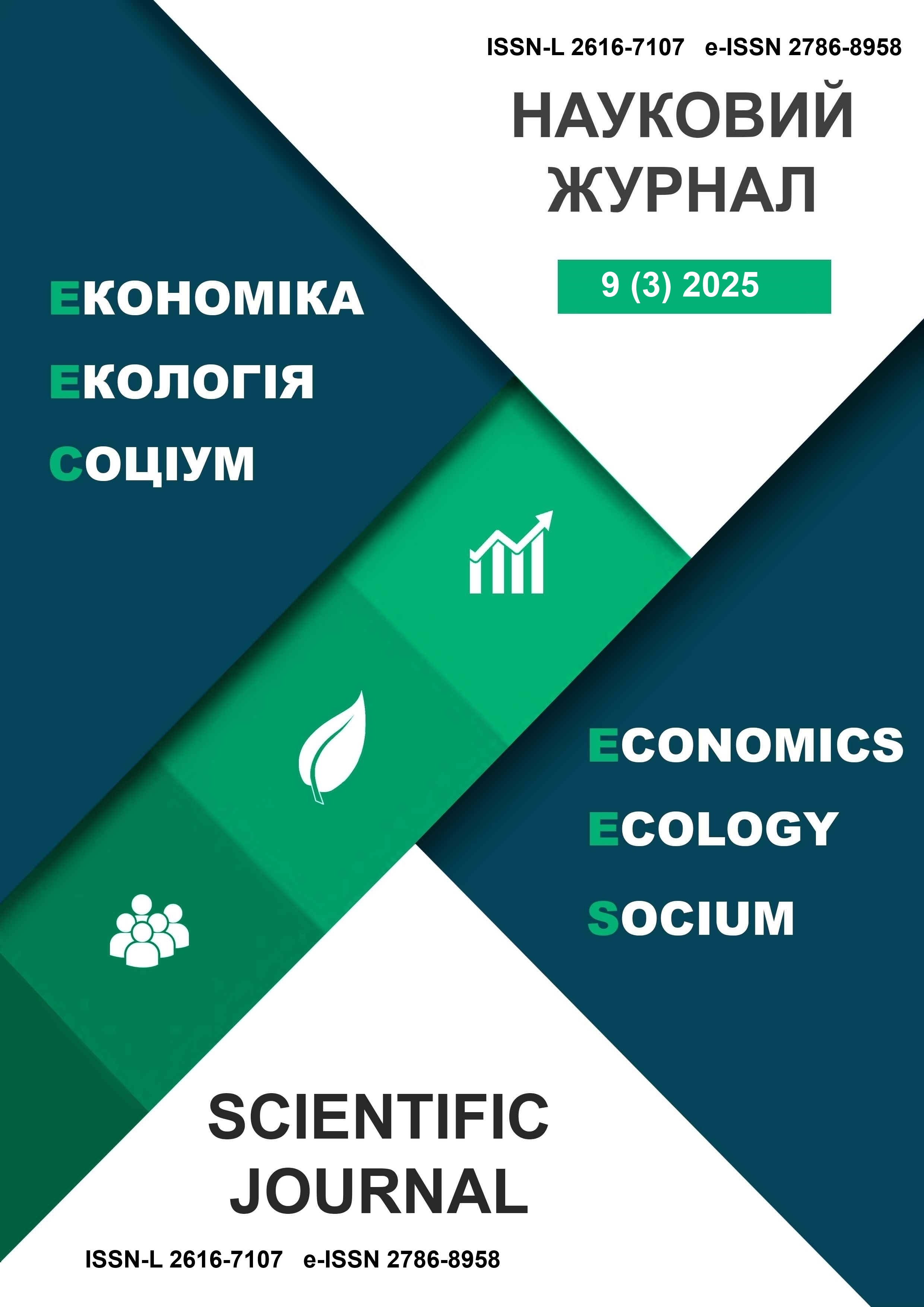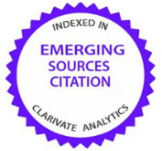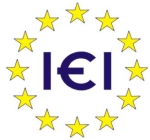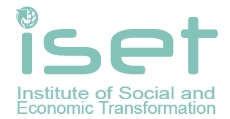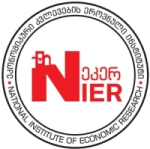Assessment of Soft Skills and Development of Human Resource Management in The Labour Market Competitiveness
Abstract
Introduction. Soft skills are critical and directly affect job performance, adaptability, and the ability to innovate. Soft skills such as creativity, emotional intelligence, critical thinking, and interpersonal interaction increase adaptability to innovation. Readiness for continuous learning and retraining through soft skills is crucial for professional success and competitiveness in the labour market.
Aim and tasks. This study comprehensively examines the impact of soft skills on professional competitiveness in the labour market. It develops a multi-level system for assessing these skills, with recommendations for their development in human resource management.
Results. The study highlighted the most in-demand skills based on feedback from academics and employers: responsibility (18.2%), creativity (18.9%), communication skills (17.3%), self-organisation (17.2%), emotional intelligence (15.9%), and leadership (12.5%). The content analysis confirms a certain degree of research into job seekers’ demand for soft skills in the labour market. This emphasises its relevance in higher or professional education settings. The employee competitiveness index (ECI) is a composite indicator that integrates the key characteristics of soft skills and amounts to 0.75%. The structural model of the study allowed us to estimate the impact of soft skills on labour productivity both directly and through employment and market demand. In the model, soft skills accounted for 18% of the variance in employment and 30% in market demand, with both indicators exerting significant effects on productivity (β = 0.32 and β = 0.29, respectively).
Conclusions. The soft skills of modern specialists indicate their competitiveness in the labour market. The criteria and indicators of soft skills (communication, emotional intelligence, creativity and analytical thinking, flexibility and adaptability, self-organisation and productivity, leadership and management skills) are highlighted, emphasising the vectors for developing these skills. The presence of soft skills increases a specialist’s competitiveness and serves as an indicator of this competitiveness. The development of soft skills increases the competitiveness of employees and contributes to efficiency growth. However, a limitation was identified: some organisations were reluctant to disclose training results, which requires further study.
Keywords:
Labour Market, Leadership, Soft Skills, Self-Organisation Productivity, Human Capital.References
Boshkoska, B. M., Sen, S. & Boškoski, P. (2025). Designing graduate business curricula by utilizing a market-driven skills extraction approach. Decision Sciences. Journal of Innovative Education, 23(2), article е70003. https://doi.org/10.1111/dsji.70003
Coursera. (2024). Global Skills Report Trusted skill insights for a rapidly changing world. https://www.alejandrobarros.com/wp-content/uploads/2024/06/GSR_2024.pdf
Federation of Employers of Ukraine. (2022). Solidarity Fund PL Enterprise Survey. https://fru.ua/images/doc/2022/EU4Skills_Sectoral_survey.pdf
Federation of Employers of Ukraine. (2023). Current needs of the labor market. Results of the study. Analytics. https://fru.ua/ua/media-center/analytics/aktualni-potrebi-rinku-pratsi-rezultati-doslidzhennya
Hair, J. F., Hult, G. T. M., Ringle, C. M., & Sarstedt, M. (2022). A Primer on Partial Least Squares Structural Equation Modeling (PLS-SEM) (3rd ed.). Sage. https://doi.org/10.1007/978-3-030-80519-7
Horova, P. (2025). What Are Soft Skills? How to Develop Your Soft Skills. NewLook school. https://www.newlook.ua/blog/shcho-take-soft-skills-yak-prokachati-navichki-soft-skilz
Khaouja, I., Kassou, I. & Ghogho, M. (2021) A survey on skill identification from online job ads. IEEE Access, 9, 118134–118153. 10.1109/ACCESS.2021.3106120
Kobets, V. & Koval, S. (2023). Bridging the gap between labor market requirements and educational program standards in Ukraine for business analysts. Applied Aspects of Information Technology, 6(2), 139–150. https://doi.org/10.15276/aait.06.2023.10
Kovtunets, V. (2022). Labor market requirements for educational and professional qualifications of employees. Bulletin of the National Academy of Vocational Education of Ukraine, 4(2), 1–7. https://doi.org/10.37472/v.naes.2022.4222
Kozminski, A. K. (2005). Flexibility-based competition: Skills and competencies in the new Europe. Human Factors and Ergonomics in Manufacturing, 15(1), 35–47. https://doi.org/10.1002/hfm.20017
Kulishov, V., Herasymenko, Y., Furs, O., & Pakhomov, I. (2024). Labour Market of Ukraine and Meeting Post-War Workforce Supply Market Demands. Economics Ecology Socium, 8(3), 27–39. https://doi.org/10.61954/2616-7107/2024.8.3-3
Kurpiela, S. & Teuteberg, F. (2023). The changing role and competence profiles of strategic oriented jobs in times of product-service systems and business analytics: An analysis of job advertisements. Computers in Industry, 149, article е103931. https://doi.org/10.1016/j.compind.2023.103931
Luchaninova, O. P. (2023). Theoretical and methodological aspects of STEAM education and their role in the formation of soft-skills in higher school students. Spirituality of the individual: methodology, theory and practice: collection of scientific works, 1(3), 67–81. https://doi.org/10.33216/2220-6310/2023-107-3-67-81
Mourtsis, D., Vlachou. E. & Dimitrakopoulos, G. (2018). Cyber-physical systems and education 4.0 – The concept of a learning factory 4.0. Procedia Manuf., 23, 129–134 10.1016/j.promfg.2018.04.005
National Qualifications Agency. (2022). Expansion of Europass with a skills intelligence tool. https://nqa.gov.ua/news/rozsirenna-europass-za-rahunok-instrumentu-analizu-navicok-skills-intelligence-tool/
Newsroom. (2025).What skills will be needed in the labor market in the next 10 years? https://novynarnia.com/2025/01/27/yaki-navychky-budut-potribni-na-rynku-praczi-v-najblyzhchi-10-rokiv/
Poláková, M., Suleimanová, J. H., Madzík, P., Copuš, L., Molnárová, I., & Polednová, J. (2023). Soft skills and their importance in the labour market under the conditions of Industry 5.0. Heliyon, 9(8), e18670. https://doi.org/10.1016/j.heliyon.2023.e18670
Popova, O. V. (2025). Professional competence as a factor in the formation of the competitiveness of future specialists in the labor market. The image of a modern teacher, 1(220), 31–35. https://doi.org/10.33272/2522-9729-2025-1(220)-31-35
Rios, J. A., Ling, G., Pugh, R., Becker, D. & Bacall, A. (2020). Identifying critical .21st-century skills for workplace success: A content analysis of job advertisements. Educational Researcher, 49(2), 80–89. 10.3102/0013189X19890600
Sergeeva, L. (2024). The key role of universal skills in the adaptation of graduates of vocational education institutions. In L. Sergeeva (Ed.), Soft skills – skills of the XXI century. What employers value most of all (рр 5–10). Bukrek. https://lib.iitta.gov.ua/id/eprint/743632
Svitlychna, A. V., Dyachkov, D. V. & Dyadyk. T. V. (2025). The main requirements of the Ukrainian labor market for the training of specialists with higher education Economic Space, 198, 109–114. https://doi.org/10.30838/EP.198.109-114
UP-STUDY. (2019). What competencies is the labor market looking for? https://up-study.ua/uk/posts/jaki-kompetenciji-shukaje-rinok-praci
Vasilyeva, T., Derevyanko, Y., Lukash, O. & Matiushchenko, M. (2022). Educational ecosystem as a modern model of improving relationships in the «education» – «labor market» system. Visnyk of Sumy State University, 4, 205–212. https://doi.org/10.21272/1817-9215.2022.4-21
WORK UA LLC. (2025). Analytics. Research. https://www.work.ua/articles/analytics
World Economic Forum. (2025). The Future of Jobs Report 2025. https://www.weforum.org/publications/the-future-of-jobs-report-2025/
Yakushenkova, O. (2025). Labor Market 2025–2030: Trends, Professions and Skills of the Future. Vseosvita. https://vseosvita.ua/blogs/rynok-pratsi-2025-2030-trendy-profesii-ta-navychky-maibutnoho-107231.html
Yashchuk, T. A. (2016). The market of educational services and the labor market: problems of interaction. Educational Dimension, 48, 102–105. https://10.31812/educdim.v48i0.2400
If the article is accepted for publication in the journal «Economics. Ecology. Socium» the author must sign an agreementon transfer of copyright. The agreement is sent to the postal (original) or e-mail address (scanned copy) of the journal editions.
